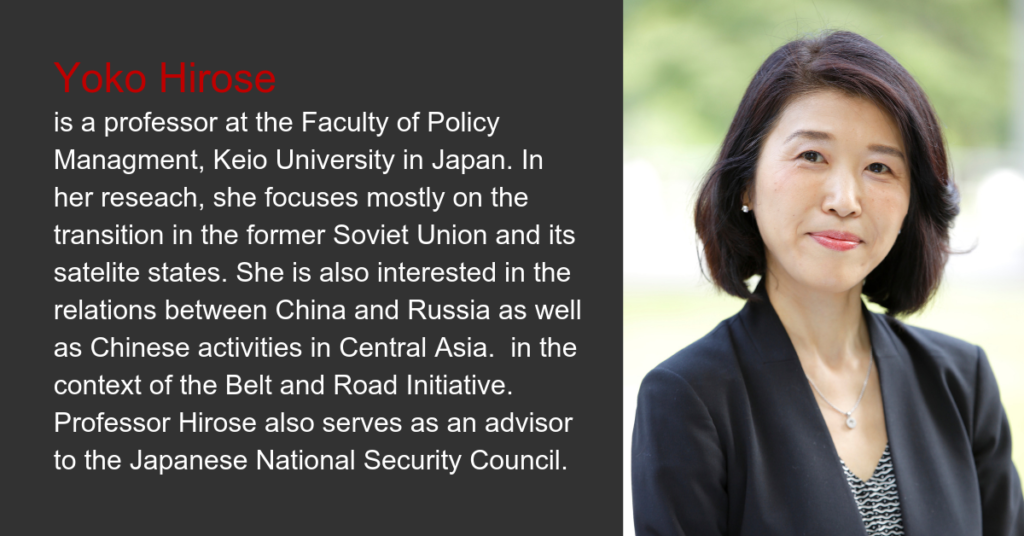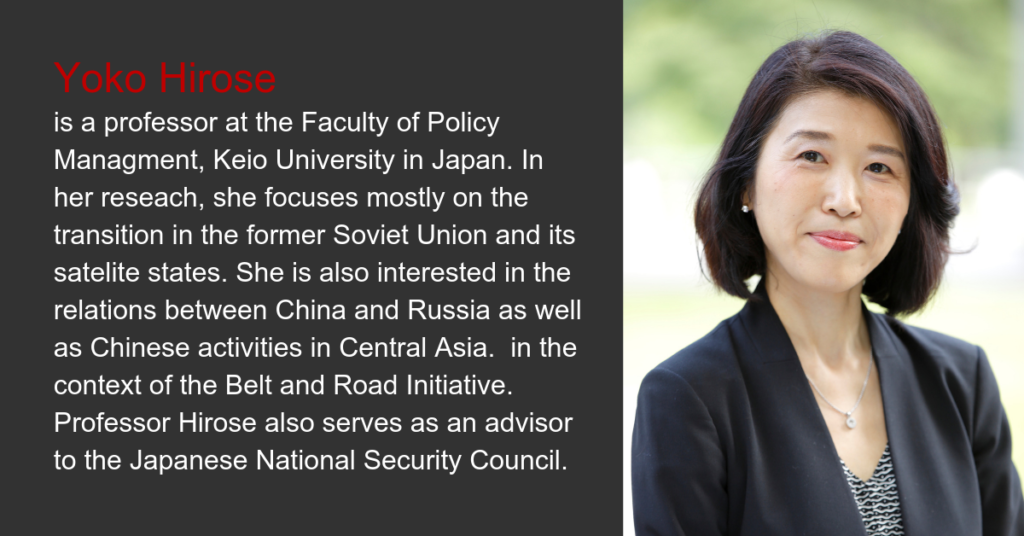Professor Hirose visited Slovakia in February 2019 to deliver a lecture on the Japanese perspective on connectivity between Asia and Europe. On this occasion, we met with her and asked her a few questions for the IAS Interviews series about her opinions on connectivity, the Belt and Road Initiative, and state of relations among Japan, Europe, and China.
For start, could you please introduce yourself shortly? Talk a bit about your expertise, specifically your interest in the issue of connectivity? Where does this interest come from?
I majored in international politics and regional studies of the former USSR, especially the Caucasus. I spent one year in Baku, Azerbaijan writing my PhD dissertation about the Nagorno-Karabakh conflict. So in general, I have been interested in conflicts in post-USSR and post-communist countries. Last year, I published one book, about the relation between China and Russia focusing on their cooperation in Eurasia.
That’s a very hot topic. And for sure, one of the hot topics as regards the relations of China with Russia, Central Asia and also Central and East Europe is connectivity. It has really been a buzzword in the last year. What is the reason that this topic has become such a hot issue in the past years?
Recently, many international actors have realized the importance of connectivity and we have seen EU’s connectivity agenda, China’s Belt and Road Initiative, Japan’s Free and Open Indo-Pacific Strategy and other similar initiatives appear. All of these initiatives focus on connectivity and inter-regional cooperation. In the era of globalization, connectivity is indispensable for both Asia and Europe, as it allows countries from both regions to attain their diplomatic goals. And that is why connectivity has become one of the buzzwords recently.
Large portion of this debate has been driven by the emergence and development of the Chinese-proposed Belt and Road Initiative. In our region, the BRI is usually mentioned in the context of connecting China with Europe, but you don’t hear that much about China connecting with other parts of the world. What role do you see Japan playing in connecting Asia with the rest of the world within the BRI and other connectivity programs?
The Belt and Road initiative has garnered great interest all over the world. But from the Japanese point of view, the BRI poses many risks to unstable countries, especially in Africa and Asia. For example, we worry about Chinese debt trap problems. For example, as I said I specialize in the former USSR and we have seen Kyrgyzstan and Tajikistan suffering from the debt trap programs from China. In Japan, our view is that we should share our technology, our skills, and help the poor, unstable countries achieve economic development by themselves. But the Chinese initiative does not give this opportunity because China is seeking only its own benefits and profits. So Japan’s diplomacy should stress the importance of sustainable development and mutual interests.
What is the Japanese interest in providing the countries in Central Asia with the alternative option of development besides the BRI. Why is Japan focusing on this?
We believe that human resources are the most important factor for achieving sustainable development. Because if young people can gain good skills, learn how to do business and so on they can help their country in a big way. But these people need the power and opportunity to make a difference. We see a large percentage of the most talented and capable people leaving their countries for the US, Europe, and other developed countries. But this way, these countries lose the opportunity to develop by themselves. So what Japan is doing is looking for perspective for the young people in their own countries. We have many training programs, we send experts and we also invite people to come to Japan.
What is the public opinion in Japan about BRI? Is it viewed as beneficial for Japan?
It is very controversial in Japan. Some people insist that Japan should have good relationship with China. On the other hand, some people claim that there are no benefits from the relationship with China and from the BRI. So it’s very controversial. Actually, some companies such as transport companies are benefiting from BRI, for example, they bought the right to for railway transportation within the Belt and Road Initiative. But in general, I think the benefits of the Chinese initiative for Japan are limited.
I’ve read that Japanese approach to development and its connectivity programs rest on three main ideas: similar to China it offers investment into infrastructure, but it also helps to build up the country’s institutions and as you already mentioned also stresses human resources and people-to-people connections. Is this something that is specifically Japanese or is this also commonplace among Western actors and their approaches to development?
In terms of infrastructure, Japan has supported building of infrastructure mainly through its official development aid. Japan attaches a lot of importance to the quality of the infrastructure. To invest in infrastructure we need enough time to analyse the situation and make a decision about what the best kind of sources is and so on. However, such a very detailed analysis needs significant resources and time. But on the other hand, the Chinese do not invest in this kind of analysis, they provide the money immediately. So instead of waiting for a long time for Japanese financing, the countries choose China. But such projects have been the main reason of the Chinese debt trap problem. For example, to use the examples of
Kyrgyzstan and Tajikistan, they have some power plants built by China. But the Chinese power plant is really a Chinese one. For example all explanations are written in Chinese characters and in Chinese language. So the local worker cannot read it, they cannot operate the equipment, so the Chinese government sends Chinese workers. And then the Chinese government asks, for example Kyrgyzstan, Tajikistan government to pay all the money for the power plant. So this is how the debt trap problem emerges. So I think if the countries chose Japan as a source of financing, they could escape such kind of problem.
You have already mentioned several times the debt trap and lack of sustainability in the Chinese approach. To me, it seems that this makes the Chinese approach different from the European or Japanese approach, which are more long-term orientated in terms of ODA and investments. So how can the EU and Japan encourage China to deal with infrastructure investments and connectivity in a more sustainable manner that would be more similar to our standards?
Unfortunately, it is very difficult to motivate the Chinese to do things in a more open and democratic way. They have a Chinese way of doing economic activity and conducting diplomacy. I think it would be the best if we could change the Chinese attitude, but I also think we will have to compete with the Chinese and their ways.
Do you see these two different approaches as complementary on some level or are they so completely opposite that no synergy can emerge between them?
The synergy between EU, Japan and China seems to be very difficult. However, I think we should and indeed have to seek synergy for getting the best results.
So far we have talked about the impact of connectivity on the recipient countries. But how is engaging in these connectivity programs helping Japan? What can Japan gain from this?
First of all, Japan is trying to increase the number of countries which share the same values. I think that these shared values are a good basis for the development of technology, skills and their economies. However, unfortunately, we don’t think that China and Russia have the same values as us. It is very easy to trade with countries that share the same values. We think that sharing the same values is beneficial for the Japanese government and the Japanese economy.
From the Japanese perspective, is there any specific priority region where Japanese activities should focus on?
Of course, we mainly concentrate on Asia and Africa but it does not mean that we ignore other regions. Japanese economic diplomacy has been very active recently all around the world, including the post-communist countries in Europe such as Slovakia.

Opinions expressed in this interview are those of the respondent and do not reflect the position of the Institute of Asian Studies.







